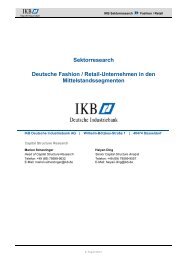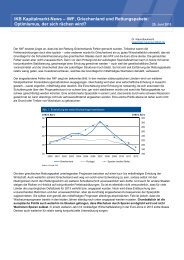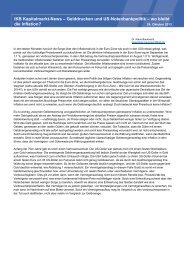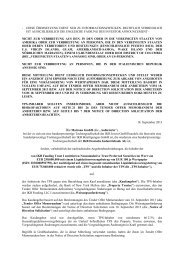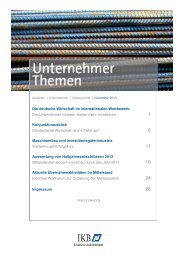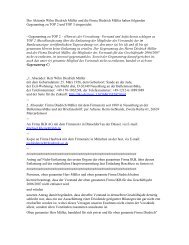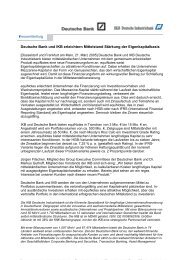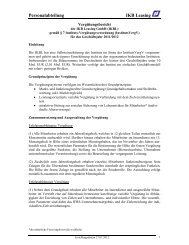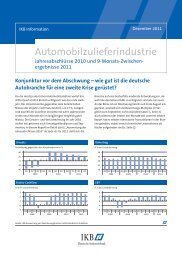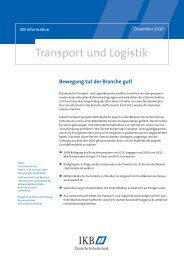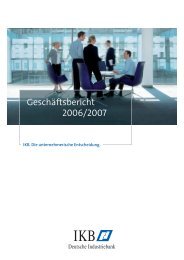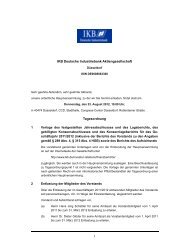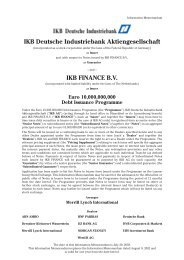IKB Deutsche Industriebank Aktiengesellschaft IKB FINANCE B.V.
IKB Deutsche Industriebank Aktiengesellschaft IKB FINANCE B.V.
IKB Deutsche Industriebank Aktiengesellschaft IKB FINANCE B.V.
Create successful ePaper yourself
Turn your PDF publications into a flip-book with our unique Google optimized e-Paper software.
Reputational risk concerns direct or indirect losses incurred as a result of damage to the <strong>IKB</strong> AG’s<br />
reputation amongst shareholders, customers, employees, business partners and the general public.<br />
Detailed information on Risk and <strong>IKB</strong> AG’s Risk Management is contained in the Risk Report as part of<br />
the respective “Management Report and Group Management Report” of the Annual Report 2004/<br />
2005.<br />
Risk Factors regarding <strong>IKB</strong> <strong>FINANCE</strong><br />
The following is a disclosure of risk factors that may affect <strong>IKB</strong> <strong>FINANCE</strong>’s ability to fulfil its obligations<br />
under the Notes. Prospective investors should consider these risk factors before deciding to<br />
purchase the Notes issued under the Programme.<br />
Prospective investors should consider all information provided in this Prospectus and consult with<br />
their own professional advisers if they consider it necessary. In addition, investors should be aware<br />
that the risks described may combine and thus modify one another.<br />
1. Due to the fact that payments of <strong>IKB</strong> <strong>FINANCE</strong> are guaranteed by <strong>IKB</strong> AG the following risks of <strong>IKB</strong><br />
AG are also risks of <strong>IKB</strong> <strong>FINANCE</strong>:<br />
a) Counterparty and credit risk<br />
Credit risk defines the risk that a loan cannot be repaid at all, or can only be partially repaid (in line<br />
with contractual agreement), in the case of default by a contractual partner.<br />
Counterparty risk is a risk as a consequence of potential replacement risks related to interest rate<br />
and currency derivatives, which may be incurred in the event of counterparty default.<br />
b) Market and liquidity risks<br />
Market risks are defined as the interest rate, currency and price risks to which equities and other<br />
assets are exposed.<br />
There are two types of liquidity risk: the risk that current or future payment obligations cannot be<br />
met on time, or in full; and the risk that required funding can only be obtained at unfavourable<br />
market conditions.<br />
c) Country risk<br />
The country rating is the key concept employed to assess and manage country risk. <strong>IKB</strong> AG’s<br />
country risk exposure is managed by using limits.<br />
d) Operational risks<br />
As defined by the Basel Committee on Banking Supervision, operational risk is the threat of loss<br />
resulting from inadequate or failed internal processes or systems, from human error, or from<br />
external events or disasters.<br />
Operational risk also includes legal risk; this is defined as the risk of loss incurred through new<br />
legal regulations, changes to existing legal regulations as well as interpretations of new or existing<br />
legal regulations that are disadvantageous to <strong>IKB</strong> AG.<br />
ITrisks focus on the measures required to develop our business continuity planning, as well as on<br />
the security of the <strong>IKB</strong> AG’s IT systems and of its data inventory.<br />
e) General business risk<br />
38<br />
General business risk is defined as unexpected negative changes in profitability as a result of a<br />
deteriorating market environment, changes in the <strong>IKB</strong> AG’s competitive position or client behaviour,<br />
or of changes to the legal framework.



